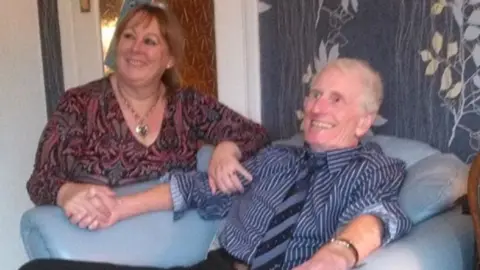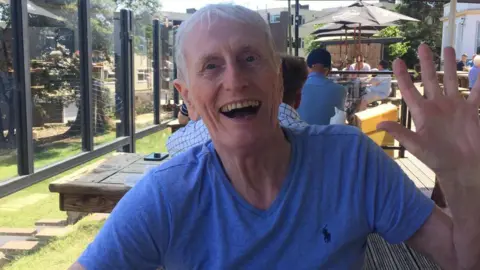'You never identify as being an unpaid carer'
 Family Handout
Family HandoutWhen Dorothy Cook's husband Melvin was diagnosed with a rare and degenerative brain disease 14 years ago, their lives took a turn.
The couple, who live in Bristol and have been together for 48 years, had built up a family, a home and their individual careers, before Mr Cook began experiencing health issues in 2010.
After three years of things being "not quite right", the 77-year-old was diagnosed with ataxia - a condition which affects co-ordination, balance and speech.
Mrs Cook, 66, juggled her own business for a number of years, but eventually had to give up work to provide round-the-clock care for Mr Cook when his health deteriorated five years ago.
“You never identify as being a carer because you just think I’m doing it as a fellow human being for my loved one," she said.
“I thought, 'I’m just Melvin’s wife and this is what he needs'."
 Family handout
Family handoutAfter being diagnosed, Mr Cook was still able to walk, talk and cook for a number of years but he slowly lost the ability to do so.
Mrs Cook said the role of being an unpaid carer "crept up" on her as the adjustments the couple needed to make were gradual.
“Now I have to do absolutely everything for him.
"He’s reliant totally on me," she added.
'No support'
Despite providing care for many years, Mrs Cook said she was "still finding out" what benefits they were eligible for.
She said the process of applying for disability benefits was "very complex" and has called for the government to "simplify" the task and signpost where to seek help and support.
“It’s up to the individual - the carer - to sit down and do their own research and find out all about it, but when you’re focusing on caring, you don’t really have the energy or the time to be able to do that.
“I wish the government would make it a more simple process to give the support to carers so that they themselves can identify as a carer," she added.
"If somebody had done this 10 years ago, I would have been able to put in some contingency plan for my future."
'I made sacrifices'
The financial impact of quitting work to become a full-time unpaid carer has left Mrs Cook worrying about her future.
Although she now receives a state pension, the couple lost out on many years' worth of income due to both of them having to leave employment earlier than planned.
"I made sacrifices years ago," Mrs Cook said.
"What is going to happen to me? How am I going to live in my old age?
"I don’t want anyone else to feel like I’m feeling at the moment."
 Family handout
Family handoutA spokesperson from the Department for Work and Pensions said: “Our country would grind to a halt without the millions of carers who provide care and continuity of support for vulnerable people every day.
“We recognise the challenges they are facing and we are determined to provide unpaid carers with the support they deserve.
"Unpaid carers not in receipt of Carer's Allowance may still be entitled to alternative support such as extra Pension Credit, and we’d urge them to check their eligibility on GOV.UK.”
'Recognise carers'
Mrs Cook acknowledged the work of charities and organisations which offer mental and emotional support through social gatherings and groups, but said she is unable to meet with others in her situation due to being housebound with her husband.
“I think people think because you’re the carer and that you’re able bodied yourself then you’re free to come and go as you want," she said.
"I can’t get out there and I’m sure there’s lots of other carers that are housebound as well."
According to Carers UK, more than half of UK adults have provided unpaid care for a loved one.
On average, it takes two years for someone to realise they had taken on the role of an unpaid carer, with many not considering tasks like cooking, assisting somebody with going to the toilet or showering as acts of care, the charity said.
Of those who act as unpaid carers, only 37% were aware of the benefits they could claim.
Mrs Cook described Carers UK as an "amazing" organisation.
“It would be nice if more people could recognise carers.
"We’re like a special group - unless you are one, you probably wouldn’t recognise someone else in that group.
"I think that needs to change," she added.
If you are affected by any of the issues in this story, the BBC Action Line has information about services that can provide support and advice.
Follow BBC Bristol on Facebook, X and Instagram. Send your story ideas to us on email or via WhatsApp on 0800 313 4630.
